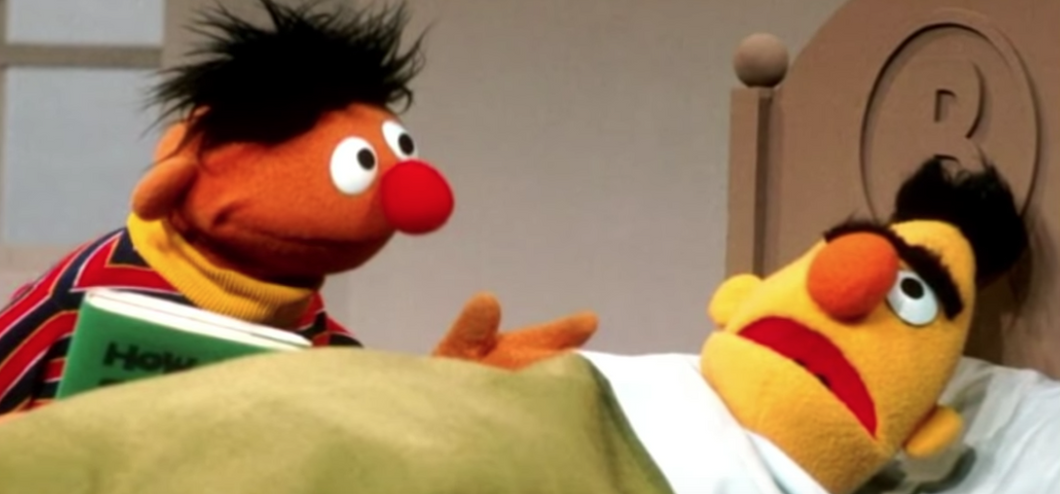It seems this argument pops up every few years or so on the internet: Are Bert and Ernie gay?
Recently, Mark Saltzman, a former Sesame Street writer, stated in his interview with Queerty: "And I always felt that without a huge agenda, when I was writing Bert & Ernie, they were [gay]."
Since then, the internet has just about exploded.
However, Sesame Street made an official statement about the relationship, saying, "As we have always said, Bert and Ernie are best friends. They were created to teach preschoolers that people can be good friends with those who are very different from themselves."
Frank Oz, the original creator of Bert, tweeted this:
So, Bert and Ernie are not gay. They're just good friends. It's a little disappointing, not going to lie. As a gay man myself, I would love to see more gay representation in media, especially in children's media.
But, at the same time, I'm pretty cool with the two just seen as friends.
Ernie and Bert promote happy and healthy male friendships, which is also very important in today's media. Affectionate platonic male relationships are extremely important. Toxic masculinity is a serious problem in America, and boys should learn from an early age that it's perfectly OK to be in an affectionate friendship with another boy.
I have no problem with Sesame Street saying they're friends.
My problem lays with their explanation of why they aren't gay.
Sesame Street stated: "…they remain puppets and do not have a sexual orientation."
That contradicts every other heterosexual pairing within the Muppets and Sesame Street. Miss Piggy and Kermit have been a couple since their creation. Gonzo and Camilla. Floyd Pepper and Janice.
And before you argue that Sesame Street is a show for toddlers and relationships don't matter there, Oscar the Grouch has a girlfriend named Grundgetta. The Count von Count has had approximately three girlfriends.
Evidently, giving a puppet a "sexual orientation" is not a problem when it comes to heterosexual couples. However, as soon as a homosexual couple is brought into the picture, suddenly giving a puppet a sexual orientation is wrong. A little hypocritical, is it not?
There is an extremely harmful stereotype in our culture that states that all gay men are promiscuous. Gay relationships are seen as inherently sexual. It's a homophobic rhetoric that dates back to the AIDS epidemic in America in the 80's, where the disease was called "the gay plague" and "God's judgment for an immoral act." The AIDS epidemic and the homophobia that sprouted from it put that stereotype on gay relationships.
Because "gay" and "sex" are associated so closely together because of this stereotype, it leads people to believe that gay couples are "inappropriate for children."
Number one, it's simply not true. Gay relationships are not more inherently sexual than straight relationships. Gay men have the same amount of intimacies as straight people, but straight relationships aren't seen as inherently sexual like gay couples are. The Muppets put a heterosexual wedding in their G-rated movie.
But putting a "sexual orientation" to a puppet is wrong, apparently.
Number two, gay representation isn't inappropriate for children. Gay families are normal. It's more and more common to see a family with two moms or two dads. Approximately 200,000 of children in American are being raised by a same-sex couple.
Kids aren't "too young" to learn about gay relationships. If they aren't too young to learn about consent and marriage, divorced parents, having a dad in prison, or deaths within the family, they are not too young to learn about gay families.
Sesame Street is a beautiful program because it doesn't shy away from teaching kids real things. Talking about divorce, incarcerated parents and family deaths are heavy topics that could be considered too hard to talk about in other children's shows. Sesame Street is not afraid to talk to children about these topics and teach them about the real world they live in.
Bert and Ernie aren't gay. Fine. But it's time to show a gay family in your program. Gay couples exist. Gay families exist. They're just as real as divorced families and incarcerated families. They deserve to be represented, too.
Frank Oz got the picture after some Twitter discussions:
We need to see ourselves on television when we're young. We need to see that we are capable of an affectionate, loving, and gentle relationship.
We need that representation from you.
















